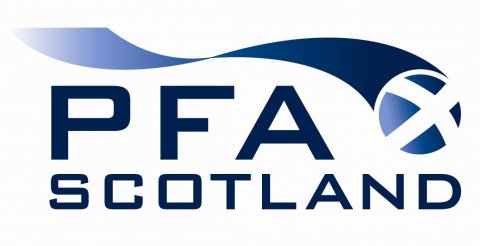The Scottish Football Association and PFA Scotland could hardly have picked a better role model than Craig Flannigan when it comes to encouraging football players into formal education. Flannigan has not so much walked a mile in the shoes of potential pupils, he has run a mile in their football boots, so when he comes to filling his role as an independent Education Co-ordinator, the former goalgrabber ‘knows his way to goal.’
 If the name sounds familiar, Flannigan was part of the very successful Scotland Under-16 side that reached the FIFA World Youth Cup Final at Hampden back in 1989.
If the name sounds familiar, Flannigan was part of the very successful Scotland Under-16 side that reached the FIFA World Youth Cup Final at Hampden back in 1989.
He said: “I was signed by Rangers in the run up to the Finals having been an ‘S’ signing with them since I had been 13.
“I had been training there three times a week during that time and the level is probably similar to the Pro-Youth Leagues that exist now.
“Three of us were signed and that was Neil Murray, David Hagen and I and the three of us were also chosen for the Scotland squad that summer.”
 The young Scots reached the Final that June only to go down in a penalty shoot-out to a Saudi Arabia side after a 2-2 draw. There was a huge difference in the physical attributes of both sides with the Saudi squad towering over the Scots with many displaying strong evidence of facial hair in comparison to their fresh faced opponents.
The young Scots reached the Final that June only to go down in a penalty shoot-out to a Saudi Arabia side after a 2-2 draw. There was a huge difference in the physical attributes of both sides with the Saudi squad towering over the Scots with many displaying strong evidence of facial hair in comparison to their fresh faced opponents.
Flannigan was being diplomatic saying: “I made one substitute appearance during that tournament and I am pretty sure Neil and David were the same.
“It has been well discussed about the ages of the Saudi’s but there is no point in going there again.
“We had a 20 year reunion in 2009 and Craig Brown was saying that their entire squad had their birthdays in August and September which seems strange and we will leave it at that.”
Both Murray and Hagan went on to play first team football for Rangers however, Flannigan did not and he gave a very honest assessment of his time at Ibrox.
The now 38-year-old said: “I never got near the first team to be honest. I played about 20 games in my first season in the reserves as it was then as there was no Under-19 set-up but I wasn’t physically ready.
“I got in because John Spencer went for a loan spell in Hong Kong and Gary McSwegan broke his leg.
“I did a lot better in the second year when Davie Dodds was coaching alongside John McGregor and scored a lot of goals but again I was not near the first team.
“By the end of my third season, I never felt it was going to work out for me there and the lack of self belief probably did not help. Halfway through the next season, I was given the chance to speak to Clydebank, who were full-time, and in the First Division then.
“I had a few months left on my Rangers deal but it was sold to me that I would play first team football and that there would be a full-time contract there for the following season if things went well.
 “I wanted to show that I could handle playing at First Division level and the Bankies were a well run family club with the Steedman brothers at the helm. They were heavily involved in running the team with Coach Jim Fallon doing the rest. I went for the latter part of the season and did enough to get asked to stay on.”
“I wanted to show that I could handle playing at First Division level and the Bankies were a well run family club with the Steedman brothers at the helm. They were heavily involved in running the team with Coach Jim Fallon doing the rest. I went for the latter part of the season and did enough to get asked to stay on.”
The following season saw Flannigan find his feet as he explained: “I scored 25 goals in my first full season and it was great playing alongside Ken Eadie who was the main man at the club.
“We had good football players in Paul Harvey, John Henry and Sean Sweeney and one of the years I was there, we had a great Scottish Cup run.
“We played Aberdeen in a bit of a mud bath similar to the Brechin City versus St. Johnstone game last weekend and were winning 3-2 with 10 minutes to go. Scott Booth came off the bench and scored twice and they won 4-3.”
Flannigan’s Clydebank career lasted three seasons and he left as the closing chapters of the Kilbowie club were beginning to be written.
He recalled: “The Steedman’s were experienced in both football and business. They saw fan numbers dwindling away and decided the way forward for Clydebank was to go part-time.
“They also saw the growth of shopping centres and that Kilbowie was a sellable asset and they judged everything about right.
“I had been advised that Clydebank would be part-time and I was not keen on that. I had options to go down south but I went back to my home town of Dumfries and signed for Queen of the South.”
They were doing a Clydebank in reverse with Flannigan explaining: “They were in the Second Division but going full-time for the first time in their history. However, the move never really worked out for me and I struggled to cope with the difference in the style of football.
“I am not being disrespectful in saying that at Clydebank, everything was on the ground whereas in the Second Division, it was back to front stuff.
“The club never really threw everything into going full-time either as they had eight full-timers the first season and three the next.”
The managerial situation at the club also caused confusion with Mark Shanks and Rowan Alexander sharing a Co-Managers tag with Flannigan saying: “I am not really sure that structure works as there was a bit of hiding behind decisions supposedly made by the other person.
 “There was some positives all the same as Jamie McAllister and David Lilley emerged during that time and have both gone on to have long term full-time careers.”
“There was some positives all the same as Jamie McAllister and David Lilley emerged during that time and have both gone on to have long term full-time careers.”
During his time at Palmerston Park, Flannigan had the light bulb moment he is now trying to provide for players across Scotland.
He explained: “I sustained an injury that was predicted to keep me out for a year and that really got me thinking about what I would do after football. I contacted the established Player’s Union at the time, the SPFA, for some funding as I wanted to do some studying into health and fitness programmes.
“I did not feel I was getting the right level of support at Queen of the South so I went and researched training and rehabilitation programmes. I had a thirst for knowledge and what I was finding out was light years from what I was doing.”
The striker regained his fitness and went in to work with Partick Thistle in the summer of 1998 to help prepare to be a player again.
It was a difficult time at Firhill with Flannigan saying: “It was Tommy Bryce who took me in there and he signed me as a player in October of that year.
“It was a difficult season as Thistle were in the Second Division not long after being a top flight club. Tommy never lasted the season and everyone there found it hard after the successes under John Lambie.”
Flannigan moved on to Albion Rovers and then Queen’s Park as his career on the field wound down. However, he was not to have too much free time on his hands.
“I qualified as a Personal Trainer in 2000 and took my first job outside of football that year. It was a bit different as I was taking guys who were on the unemployment register and making them fit enough to join the army.
“It was the first time the course had been run in Scotland and it gave me a very different outlook on life and when you consider I had not read a book in 12 years apart from autobiographies, it gives you an idea of the journey I had started.”
After qualifying as a Fitness Coach, Flannigan continued to grow as he said: “I went on to a Post Graduate course run by the English FA that took three years. That looked into fitness, conditioning, physiology and football and that was another great stage of my journey.”
 That journey saw the Educational Co-ordinator role become a destination as Flannigan explained: “I had carried on learning and was doing some fitness work in Cumbernauld College when I learned that there was a position at the SPFA becoming available. I spoke to Fraser Wishart and Tony Higgins and fortunately, I got the job.”
That journey saw the Educational Co-ordinator role become a destination as Flannigan explained: “I had carried on learning and was doing some fitness work in Cumbernauld College when I learned that there was a position at the SPFA becoming available. I spoke to Fraser Wishart and Tony Higgins and fortunately, I got the job.”
The investment made into becoming a Fitness Coach has not been wasted as Flannigan explained: “I work on a freelance basis in fitness doing the pre-season training programme for St. Johnstone. That involves working closely with the Manager there Derek McInnes and the players and Derek and I chat throughout the season on how things are going.
“I also did some work with Livingston when Mark Proctor was there and it is something I still enjoy but I prefer the security of the education work.
“Manager’s jobs in football are far too precarious and when they go, the backroom staff seem to go as well so I have never looked to take it further or get into the coaching side of things.”
Flannigan was asked to explain what his Educational Co-ordinator role is and he said: “In short, my job is to raise awareness of lifelong learning in the football community.”
Flannigan’s experiences in football have proven invaluable in his role as he said: “When I talk to players now, I can empathise with their aspirations to be the next David Beckham. I wanted to be the next Ally McCoist and it is great to have aspirations but in reality, 78% of the boys coming into football are out of it by their 21st birthday. That reality is harsh so players need a Plan B.
“It is difficult for 16-year-olds to grasp that so we speak about dual goals – playing ones first and educational ones second.”
Flannigan also assists the SFA to look after the welfare of apprentice footballers in club’s Pro-Youth programmes as he explained: “Educating apprentices is now mandatory within modern apprenticeship schemes. We match the courses available with academic ability and those secondary ‘What If’ plans.
“Some boys are focused whilst for others, it can maybe be a pain as they do not know what they are wanting from life yet.
“You need to have all apprentices doing it as you cannot have some guys studying and other boys not doing anything as that just causes additional management issues at a club.
“Sometimes the penny does not drop until a player finds himself released aged 19 and goes into a job market with no qualifications.”
The approach with senior players is different as Flannigan explained: “Once players get older, they tend to approach you perhaps when they start thinking about their career ending or a life changing event happens such as getting married, having a child or taken on a mortgage.
“PFA Scotland can help players through their Education Trust as they can pay a contribution for courses. Clubs as employers can tap into the Skills Development Scotland funding to help as well.”
There is another exciting development on the horizon with Flannigan saying: “The worldwide representative organisation for all professional players, FIFPro, are to launch an on-line Business course that is supported by 26 of the individual unions in Europe such as the Nordic nations, England, Ireland and ourselves.
“That course will be free for players and we will be recruiting for that soon.”
Flannigan was asked how he would have reacted to educational promptings when he was starting his career and he said: “Well, put it this way, I would not have believed that I would be doing this. This is not the way I thought things would turn out when I signed for Rangers.
“I thought I would be retired at 35 with a villa in Spain, so I know it is a challenge to give players a nudge towards education.”
These nudges can be successful all the same with Flannigan advising: “There are 12 senior players in the SFL and SPL currently studying for degrees.
“Studying for a Sports Degree is actually in the minority as there are guys doing business, psychology, mathematics and economics so it is wide and varied learning that it is going on.
“I have to compare all that to a player that recently finished and he cannot afford to take time out to study as he needs to work to earn money.
“He played for one of the Old Firm teams and played abroad but he now needs another career as he picked up an injury. He wishes he had started courses with the spare time he had when he was a full-time player.
“He cannot afford to take four years out and get a degree so he is stuck in a bit of a vicious circle as he is unable to take time off as he would lose money and he cannot get a better job as he does not have the time to study for qualifications.”
It is not just qualifications that help players find employment as Flannigan explains: “Players have attributes that employers like as they will be physically fit and tend to be resilient characters as well.
“They have to be able to play in a team and be dedicated and employers like these traits. If players add an educational qualification to this list, I believe they are ahead of other applicants.”
Flannigan summed up the latter part of his career in football by saying: “I was fortunate that when I developed my thirst for knowledge, I could develop that into becoming a Fitness Coach.
“I was never quite able to make that my career all the same because I got the position with the Player’s Union but it has not been wasted because of the work I do with St. Johnstone.”







.png)












